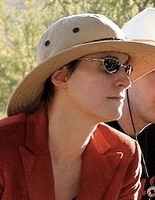L. A. Paul University of North Carolina at Chapel Hill (Photo L. A. Paul 2006 © Jiri Benovsky) L. A. Paul works on a range of topics, from the metaphysics of causation and time to the epistemic puzzles raised by transformative experiences like having a child. Much of her early work in metaphysics focused on fundamental ontology, especially on the nature of properties. She argues that the world is built from properties alone, and that there is no deep metaphysical difference between properties and objects. Instead, the world is, fundamentally, a mereological mix of qualitative natures. To support this view she develops a mereology of properties as parts and of ordinary objects as fusions of properties, and argue that this metaphysical view fit better with fundamental physics than more "ordinary" views which endorse the existence of substances. These sorts of reflections on the fundamental structure of reality have led her to investigate the methodological connections between metaphysics and science on the one hand and metaphysics and ordinary experience on the other, and some of her more recent work develops connections between physics and metaphysics, as well as between cognitive science and metaphysics. The idea that best unites her current interests is the importance of using experience, or what she would describe as "phenomenology," in making sense of the world around us. Thus, she is fascinated by how we experience causation and time, and in particular how we experience ourselves as perceivers in time and as causal manipulators and agents. This draws her to empirical work in psychology, especially developmental psychology and cognitive science. She has just published a book on the metaphysics of causation, and she is developing a series of papers on the relationship between time and our experience of time, especially our experience of the passing of time and of the way the past differs from the future, drawing on connections between the cognitive science of temporal perception, the metaphysics of the temporal direction and temporal passage, and thermodynamics and entropy. Consistent with her primary philosophical focus on phenomenology and its role in how we understand the world around us, she has also been investigating questions about how phenomenology interacts with decision theory, especially in the context of major or life-changing decisions. She is especially interested in-- if we think of ourselves as making decisions that affect our lives as experiencing selves-- how we should approach life-changing decisions to act in ways that that modify who we are or how we experience (they are transformative experiences). Such decisions are often epistemically impenetrable in a special way, since we need to actually have had the experience we are contemplating undergoing before we can assess its value and fully grasp how it might change us. This situation has some interesting philosophical implications, especially because decision theory may not have the resources to model all the important features of such decisions. The possibility of transformative experiences raises interesting questions about how we should think about making major life decisions, whether we should think of ourselves as rational actors when making major decisions, and how we are to assess our own well-being, especially over the long term. |
Home > Highlighted Philosophers >

